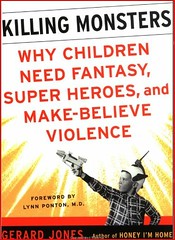 Regular readers will recall my great interest in video games and the public policy debates surrounding efforts to regulate "violent" games in particular. One thing I bring up in almost every essay I write on this subject is how fears about kids and video games are almost always overblown and that kids can typically separate fantasy from reality. Nonetheless, kids have active imaginations and adults sometimes fear that which they cannot understand or appreciate. Friendly mentoring and open-minding parenting can go a long way to encouraging kids to make smart choices and understand where to draw lines, whereas efforts to demonize video games and youth culture almost always backfire.
Regular readers will recall my great interest in video games and the public policy debates surrounding efforts to regulate "violent" games in particular. One thing I bring up in almost every essay I write on this subject is how fears about kids and video games are almost always overblown and that kids can typically separate fantasy from reality. Nonetheless, kids have active imaginations and adults sometimes fear that which they cannot understand or appreciate. Friendly mentoring and open-minding parenting can go a long way to encouraging kids to make smart choices and understand where to draw lines, whereas efforts to demonize video games and youth culture almost always backfire.
Anyway, what got me thinking about all this again was an entertaining column in today's Washington Post by Ron Stanley ("Who Needs a TV to Play Video Games"), which describes the author's experiences with his nephew when they played out video game-like scenarios using traditional toys and household items. It's a wonderful piece worth reading in its entirety, but here's the key takeaway that I'd like to discuss:
There was no evidence that television and video games had stifled the kids' creativity. Nor was there any evidence that technology had made them smarter than earlier generations. They simply had a different frame of reference, one that included video games and computers as well as ponies, pet stores and sword fights. Children play with the tools at hand, and they're great at thinking metaphorically -- at imagining that a landspeeder is a sentient robot or that a stick is a gun or that salt-and-pepper shakers are a bride and groom or that a card table is a horse's stable.They're also geniuses at figuring out simple mechanics. My 6-year-old nephew had to explain to me that miniature low-rider cars don't roll very well on carpet and will flip over more than if racing on hardwood floors. Novice that I was, I was choosing cars that looked the coolest. And they are geniuses at intuiting rules and systems, and at re-creating these rules and systems in their own play. Children who play lots of card games will invent their own card games. Children who play lots of board games will invent their own board games. And children who play lots of video games will invent their own video-game-like games when they don't have access to the game controllers.
What Stanley was discovering with his nephew is that (1) kids have rich imaginations and love play-acting and just being creative, and (2) video games have become part of the new narrative of adolescent play-acting and creativity. Kids adapt and learn to cope with new cultural and technological realities; often much quicker than their parents. More importantly, much of their play-acting, including that in which they play out "violent" scenarios, is an entirely natural part of childhood.
 Henry Jenkins has done some brilliant work on this front, and the new book Grand Theft Childhood by Kutner and Olson is also essential reading in this regard [my lengthy review is here]. But the best thing every written on this subject is Killing Monsters: Why Children Need Fantasy, Super-Heroes, and Make-Believe Violence, by Gerald Jones. It is a masterpiece, and I wish every parent and policymaker in America could read it before they propose the regulation of video games. As Jones correctly notes, "Video games are most threatening to adults who have seen images of them but never tried to play them." He continues:
Henry Jenkins has done some brilliant work on this front, and the new book Grand Theft Childhood by Kutner and Olson is also essential reading in this regard [my lengthy review is here]. But the best thing every written on this subject is Killing Monsters: Why Children Need Fantasy, Super-Heroes, and Make-Believe Violence, by Gerald Jones. It is a masterpiece, and I wish every parent and policymaker in America could read it before they propose the regulation of video games. As Jones correctly notes, "Video games are most threatening to adults who have seen images of them but never tried to play them." He continues:
One of the functions of stories and games is to help children rehearse for what they'll be in later life. Anthropologists and psychologists who study play, however, have shown that there are many other functions as well--one of which is to enable children to pretend to be just what they know they'll never be. Exploring, in a safe and controlled context, what is impossible or too dangerous or forbidden to them is a crucial tool in accepting the limits of reality. Playing with rage is a valuable way to reduce its power. Being evil and destructive in imagination is a vital compensation for the wildness we all have to surrender on our way to being good people.
And "playing with rage" is exactly what we old farts were doing as kids too when we played (politically incorrect) games like "Cowboys and Indians" or countless other games that involved toy guns, cap guns, slingshots, bows-and-arrows, and the like. Of course, my generation gradually traded in our BB guns and slingshots for digital equivalents as video games came on the scene. And that was probably a good thing since, as Ralphie's mom always warned us, "You'll shoot your eye out" with those things!)
Bottom line: Cultures and the nature of childhood play-acting fantasies may change, but what will never change is the fact that kids need their fantasies. This is why I get down on my knees every night with my two kids and "play monster" with them. I stuff pillows in my shirt and let them bop me good as my dog and I chase them around and try to put them in "the dungeon" (which is usually a laundry basket or cardboard box). The X-Mas season is always great because we have a ton of those left-over cardboard tubes from wrapping paper, which still make the best toy swords. The game typically ends after Dad gets tired of getting bopped and plays "dead" so that the kids can declare victory and return to their castle and go to bed. But lately we've been playing video games together that play out in similar ways. (Lego Star Wars and Little Big Planet are big hits in our house currently.)
In the end, it's just a different sort of fantasy. And they need all of them to become well-functioning adults. As Judge Richard Posner argued in his tour-de-force opinion in the 2000 case of American Amusement Machine Association v. Kendrick:
"Self-defense, protection of others, dread of the 'undead,' fighting against overwhelming odds--these are all age-old themes of literature, and ones particularly appealing to the young." ... "To shield children right up to the age of 18 from exposure to violent descriptions and images would not only be quixotic, but deforming; it would leave them unequipped to cope with the world as we know it." ... "People are unlikely to become well-functioning, independent-minded adults and responsible citizens if they are raised in an intellectual bubble."
Exactly. Why can't others see this?
Incidentally, I should mention that I just bought my son his first set of boxing gloves and a punching bag for a Christmas present. I'm going to let him beat up the bag a little to give my belly and head a rest!